Reading the Entrails
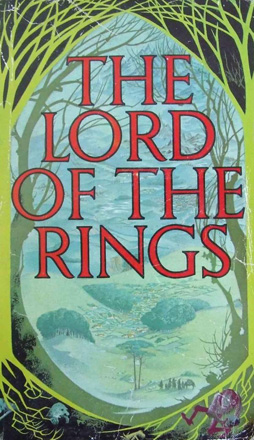 Browsing about the Internet recently, I stumbled on something that interested me. Several things, actually. Specifically, the results at the Internet Speculative Fiction Database of various Locus audience polls; more specifically, the results of the all-time polls in the fantasy field. I was struck by how some things stayed constant across the years, and how some other things have changed.
Browsing about the Internet recently, I stumbled on something that interested me. Several things, actually. Specifically, the results at the Internet Speculative Fiction Database of various Locus audience polls; more specifically, the results of the all-time polls in the fantasy field. I was struck by how some things stayed constant across the years, and how some other things have changed.
Now, it’s important to be wary of making overly-sweeping statements about the fantasy field based on these polls. These are things that can be compared with one another; I don’t know if they can be said to have weight beyond that. But, given that, what can one take away from them?
Let me be precise about what I’m looking at. The polls that interest me are the 1987 poll for best all-time fantasy novel, the 1987 poll for best all-time fantasy novelist, the 1998 poll for best fantasy novel before 1990, the 1998 poll for best all-time fantasy novelist, the 1999 poll for best all-time fantasy author, and the 2012 poll for best fantasy novel of the 20th century (John O’Neill wrote about that last poll for Black Gate). There are also all-time polls for science fiction, and some older polls that just asked the Locus readership for best all-time author or novel without specifying genre; I’m interested in fantasy, though, so that’s what I’m focusing on.
You can see some constants in the rankings of the books, but also movement. Some books and authors fell out of favour, some maintained their positions, and a few new titles emerged over time. So together the lists are potentially a glimpse of how attitudes to the genre developed over the course of twenty-five years among fans.
But even assuming that the poll respondents represent a group relatively knowledgeable about fantasy, do the polls say more about fantasy or more about the Locus readership?
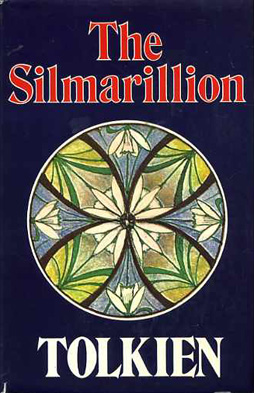 According to the isfdb, the annual Locus polls were “established in the early ’70s specifically to provide recommendations and suggestions to Hugo Awards voters.” Sometimes those polls also included all-time polls, which are the ones I’m looking at now. As I said, the first all-time polls (in 1975) weren’t divided by genre; that started in 1987. Respondents to a poll could typically list up to five works in a given field, with points awarded to a work according to its placement on the ballot. The 2012 poll allowed up to ten works to be listed in the ‘best of the 20th century’ field.
According to the isfdb, the annual Locus polls were “established in the early ’70s specifically to provide recommendations and suggestions to Hugo Awards voters.” Sometimes those polls also included all-time polls, which are the ones I’m looking at now. As I said, the first all-time polls (in 1975) weren’t divided by genre; that started in 1987. Respondents to a poll could typically list up to five works in a given field, with points awarded to a work according to its placement on the ballot. The 2012 poll allowed up to ten works to be listed in the ‘best of the 20th century’ field.
So far, so good. But some problems are immediately obvious. Firstly, looking at the full list of votes from the 2012 poll, you can see some people chose to vote for whole series, and that these votes were counted separately from votes for individual titles within the series. I don’t see what else the poll administrators could have done, but there is the real possibility of some vote-splitting, in at least some cases. On the other hand, third and fourth spots in the 1998 ‘Best Novel’ poll go to series rather than individual books. So, again, there is the potential for some confusion.
Secondly, and related to the foregoing, some books have been chosen that aren’t really novels. In John’s look at the 2012 poll for Black Gate, Sarah Avery observed that it’s really stretching things to call The Silmarillion a novel. There’s a good post here that looks at some of the other definitional issues — The Dying Earth, for example, is a collection of short stories — as well as highlighting the confusing listing of a book simply identified as Conan the Barbarian (1950): either the 1950 novel Conan the Conqueror, or the 1955 collection Conan the Barbarian.
Thirdly, so far as I can tell, there’s no hard-and-fast guideline offered for what fantasy is. This is potentially liberating, allowing different people to vote for entirely different selections of texts. In practise, it does look as though it allows for a certain amount of science fiction books to gain votes — looking at that 2012 list, I note Lord Valentine’s Castle ended up in 44th place, which struck me when I read it as purely science fictional. You can’t help but notice that a number of liminal cases (Nine Princes in Amber, The Book of the New Sun, and Dragonflight, for example) also placed fairly high as well.
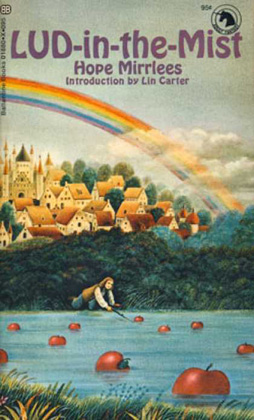 Which brings me to my final major point about the lists: one might well wonder whether these are lists chosen mainly by fantasy readers, or mainly by science-fiction readers who happen to also read fantasy. Obviously it’s quite possible to enjoy both kinds of books, but it’s also at least as likely that a reader will enjoy both but have a preference for one (as I enjoy science fiction, but tend to prefer fantasy).
Which brings me to my final major point about the lists: one might well wonder whether these are lists chosen mainly by fantasy readers, or mainly by science-fiction readers who happen to also read fantasy. Obviously it’s quite possible to enjoy both kinds of books, but it’s also at least as likely that a reader will enjoy both but have a preference for one (as I enjoy science fiction, but tend to prefer fantasy).
The high placing of fantasy texts with science fictional leanings would seem to support that. So would a look at the lists that resulted when the genres weren’t divided: pure fantasy writers don’t do too well. Tolkien takes first spot in the ‘best fantasy novelist’ and ‘best fantasy author’ polls, but rises no higher than fourth in his highest placing in ‘all-time best author.’ Le Guin does better — but then, she’s also a science fiction writer. (I have to wonder if this sort of thing also explains Glory Road appearing in the first two ‘best books’ list, as well as making 60th spot in the 2012 list; looking at the favourite sf author lists, Locus poll responders do seem to like voting for Heinlein.)
Given all that, what can we see in these lists?
To start with, it has to be said that they tend to be weighed toward white males. The 2012 poll results prompted much discussion along these lines (check the comments in the links), but it’s certainly something visible in the earlier lists as well. Rich Horton has suggested that this has to do with the historical conditions governing the creation and publication of genre work in the 20th century, which resulted in a disproportionate amount of work by white men being published.
That’s likely true to a point, but I think more can be said. Given that sexism and racism have affected the creation of novels in and out of genre, they also affect the way that works are distributed, in terms of the amount of resources given to a book by its publisher, the amount a book is ordered by bookstore buyers, and the placement and publicising of the book in bookstores. And then they again affect the ways books are spoken and written about once they’re created — works by women and non-white authors are disproportionately under-represented in reviews and in the secondary literature about fantasy.
There’s nothing new in these observations; they turn up whenever anybody counts the number of reviews for female and non-white authors in the speculative fiction field. So the practical result is that readers are left unaware of work that they might have enjoyed, if they’d ever heard of it. I’d like to think that future polls of the best of 20th century fantasy might include higher listings for books like Hope Mirrlees’ Lud-in-the-Mist (54 in the 2012 poll), or Virginia Woolf’s Orlando (159), or Salman Rushdie’s Satanic Verses (331), or Amos Tutuola’s Palm-Wine Drinkard (tied for 379), or Joyce Carol Oates’ Bellefleur (tied for 379), or Toni Morrison’s Beloved (tied for 542).
 But that set of titles points up another limitation of the best-books lists: most of the books were published as explicitly genre works. Sometimes the genre’s science fiction or fantasy, and very frequently children’s literature (or YA), but books originally published as what has been called ‘literary’ fiction don’t seem to do terribly well in these polls. Jorge Luis Borges turning up at number 44 in the 1999 poll for best fantasy author stands out as an almost unique result.
But that set of titles points up another limitation of the best-books lists: most of the books were published as explicitly genre works. Sometimes the genre’s science fiction or fantasy, and very frequently children’s literature (or YA), but books originally published as what has been called ‘literary’ fiction don’t seem to do terribly well in these polls. Jorge Luis Borges turning up at number 44 in the 1999 poll for best fantasy author stands out as an almost unique result.
You could certainly argue that John Crowley’s continued high placement for Little, Big is another exception, but his first books were published as speculative fiction. And similarly I feel the placement of writers like Tolkien, E.R. Eddison, and Mervyn Peake in the fantasy lists are equivalent to the appearance of writers like Welles or Olaf Stapledon in the science fiction lists — they’re writers retroactively claimed by genre.
My point is that writers outside the genre mainstream rarely appear, and when they do they’re down the list; in the 2012 poll, Gabriel Garcia Marquez’ One Hundred Years of Solitude is only in 48th place, for example. John Gardner’s Grendel is tied for 237. There’s no Peter Ackroyd or Iain Sinclair or John Cowper Powys at all.
And, conversely, even when a writer like J.G. Ballard turns up, he’s much lower down than you might think (starting with The Unlimited Dream Company at 263), and I note even his science fiction doesn’t make it terribly high (The Drowned World hits 163). Incredibly, Kafka’s lone appearance on the list is The Castle, which is in a tie for 379th. (Interestingly, the big exception to the absence of literary fantasy is Bulgakov’s The Master and Margarita, which placed at 20 in the 2012 poll but didn’t appear in any of the earlier lists.)
Add it all up, and it seems that the definition of ‘fantasy’ that emerges from the collective poll of voters is very conservative. ‘Fantasy’ and ‘genre fantasy’ seem almost identical. To an extent that’s not surprising — the more voters you get, the more the overlap will tend to emerge as the apparent consensus, and ‘genre fantasy’ is likely to be most of that overlap. People will think of different things when they think of ‘fantasy,’ but among those things each of them think of will be ‘genre fantasy.’ Again, I can’t help but suspect that many of these readers would like some of the work that gets published outside the fantasy field, and I hope as time goes on that certain books will end up being claimed for fantasy in the way of Eddison or Peake. We’ll see.
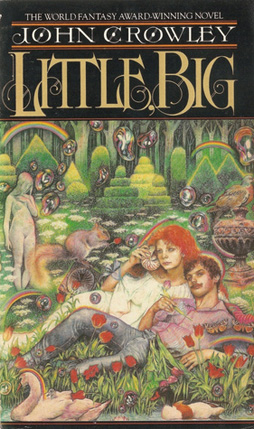 Of the books that do make the lists, what can we see? What stays the same, and what changes?
Of the books that do make the lists, what can we see? What stays the same, and what changes?
Well, the first thing you notice is Tolkien’s absolute dominance of all the polls. The Lord of the Rings and The Hobbit are the top two books in both of the 20th-century polls, while Tolkien’s the favourite author. The 2012 list shows some change — A Game of Thrones takes over the second spot from The Hobbit — but also shows how great the margin is for Lord of the Rings. That book got more than twice as many points as A Game of Thrones, more than twice as many total votes, and ten times as many first-place votes.
In fact, Lord of the Rings drew more first-place votes than any other book drew total votes. More: about 60 percent of the votes cast for Lord of the Rings were first-place votes (205 of 340). That’s an incredibly high ratio. A Game of Thrones drew 20 first-place finishes out of 152 votes; The Hobbit, 20 of 138. Perdido Street Station, at 6th place, does comparatively well with 12 first-place finishes in 64 votes, and Little, Big at tenth spot gets 10 of 41.
Basically, Lord of the Rings isn’t just a book a lot of people like, it’s a book a lot of people love.
That said, what looks at first glance like little change at the top of the list hides some shifts lower down. Let’s leave aside the ‘best novelist’ polls for now (because there’s only two of them), and focus on the ‘best novels.’ The top four or five books are basically the same across the board; Lord of the Rings, The Hobbit, and A Wizard of Earthsea all in the top 4, with A Game of Thrones grabbing the third spot in the 2012 list.
Gene Wolfe’s Shadow of the Torturer is 3 in 1987, the overall Book of the New Sun is 4 in 1998, and then drops all the way to 18 in 2012 (as a series; individual books come in lower down — Torturer in 279, Citadel of the Autarch at 541, as well as Urth of the New Sun at 447 — and if you add them all in, it’d move the series up to 16; the Earthsea Trilogy comes in at a tie for 73, but adding those votes to A Wizard of Earthsea doesn’t shift Wizard‘s overall position). On the other hand, Zelazny’s Nine Princes in Amber takes the 5th spot in 1987, drops to 9 in 1998, then rebounds to 5 in 2012.
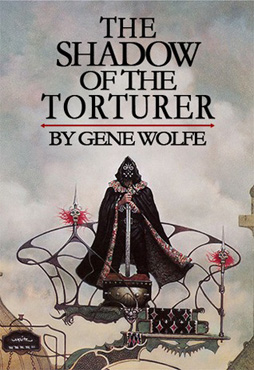 That seems to me to be unusual. I see a lot more books following the pattern of Wolfe’s book rather than Zelazny’s. Peter S. Beagle’s The Last Unicorn goes from 5 to 18 to 14, The Riddle-Master of Hed goes from 13 to 22 to 57, The Incompleat Enchanter goes from 14 to 35 to 110, Katherine Kurtz’ Deryni Rising goes 29 to 30 to 263, Eddison’s The Worm Ouroboros goes from a tie for 29 to 23 to 61, and Anne McCaffrey’s Dragonflight goes from 9 (with book 3 at 23) to 11 to 41 (with book 3 at 126). John Myers Myers’ Silverlock goes from 21 to not being listed in 1998 to 373 in 2012.
That seems to me to be unusual. I see a lot more books following the pattern of Wolfe’s book rather than Zelazny’s. Peter S. Beagle’s The Last Unicorn goes from 5 to 18 to 14, The Riddle-Master of Hed goes from 13 to 22 to 57, The Incompleat Enchanter goes from 14 to 35 to 110, Katherine Kurtz’ Deryni Rising goes 29 to 30 to 263, Eddison’s The Worm Ouroboros goes from a tie for 29 to 23 to 61, and Anne McCaffrey’s Dragonflight goes from 9 (with book 3 at 23) to 11 to 41 (with book 3 at 126). John Myers Myers’ Silverlock goes from 21 to not being listed in 1998 to 373 in 2012.
It’s not an across-the-board drop — John Crowley’s Little, Big, for example, holds remarkably steady at 10, 8, and 10 — but it does suggest that some books are losing their hold as we move further from their publication date and more titles enter the field. I note that McCaffrey went from 3rd-favourite novelist in 1987 to 12th in 1998, Beagle from 4 to 16, McKillip from 11 to 22, de Camp and Pratt from 17 to off the list, Kurtz from 21 to off the list. But with no ‘best fantasy author of the 20th century’ category in 2012, there’s a data point missing. John Crowley rises from 12 in 1987 to 6 in 1998; Lewis Carroll from 10 to 4. Is this meaningful, or statistical noise?
Well, this is hardly a scientific study in any case. Let’s try something else. Let’s look at things chronologically. It’s often said that Lord of the Rings birthed genre fantasy, but that it took until 1977 for the genre to really take flight commercially. What happens if we divide up the different lists by publication date?
Both the 1987 and 1998 best books list have three volumes from the 19th century: Alice’s Adventures in Wonderland, Dracula, and The Wizard of Oz. That continuity suggests something (obviously, none of those books fit the ‘20th century fantasy’ requirement of the 2012 list).
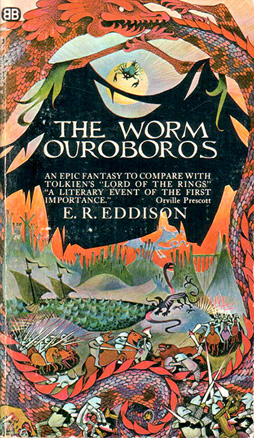 With respect to books that appeared between 1901 and 1955, when The Lord of the Rings was published, those two lists also largely agree — eight books appear on both lists, while Conjure Wife appears on the earlier but not the later. Most of that eight also appear in the top 40 books of the 2012 list, with only The Worm Ouroboros dropping to 61 and The Incompleat Enchanter dropping to a tie for 200th, while the mysterious Conan the Barbarian (1950) appears. (I’m going to continue talking about the top 40 of the 2012 list in the next few paragraphs, just for the sake of picking a round number that’s vaguely comparable to the 33-book list of 1987 and the 36-book list of 1998.)
With respect to books that appeared between 1901 and 1955, when The Lord of the Rings was published, those two lists also largely agree — eight books appear on both lists, while Conjure Wife appears on the earlier but not the later. Most of that eight also appear in the top 40 books of the 2012 list, with only The Worm Ouroboros dropping to 61 and The Incompleat Enchanter dropping to a tie for 200th, while the mysterious Conan the Barbarian (1950) appears. (I’m going to continue talking about the top 40 of the 2012 list in the next few paragraphs, just for the sake of picking a round number that’s vaguely comparable to the 33-book list of 1987 and the 36-book list of 1998.)
So far so good, but what happens with more recently published books is interesting. The 1987 list had 13 titles published in the years from 1956 to 1976, and 8 from 1977 to 1987. That seems to fly in the face of the idea that fantasy as a genre emerged in the years after 1977. The 1998 list had 14 from 1956 to 1976, dropping Salem’s Lot to add the “Elric” and “Fafhrd and the Grey Mouser” stories; so essentially the same titles appear on both lists.
But in 2012 things are very different. Swords of Lankhmar stays on the list, while the “Elric” stories drop off (Stormbringer’s at 113, Elric of Melniboné’s at 234) — and so does Dragonflight (well, down to 41, anyway), The Riddle-Master of Hed (down to 57), Glory Road (down to 60), Witch World (down to 76), and Deryni Rising (down to 263). The Princess Bride and The Master and Margarita replace them.
What looked like an emerging consensus has shifted a bit. And the era as a whole seems to have lost traction in 2012, leaving only 10 books from these 21 years represented.
That’s not far off, percentage-wise — a bit more than 20 percent of the century takes up 25 percent of the top 40. But then the next thirteen years, from 1977 to 1989, produces ten books as well. Again, the 1987 list had 8 books published after 1977; the 1998 list had 12 books from 1977 to 1989 (remember, that poll was for ‘best novels before 1990’).
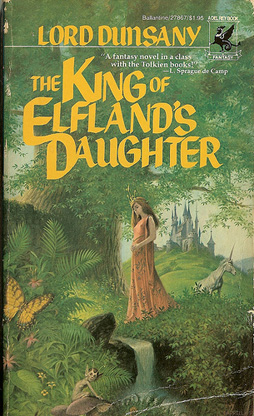 These lists, unsurprisingly, are the most fluid. Fully half the picks from 1987 didn’t make the 1998 list — McCaffrey’s White Dragon, The Shining, A Spell For Chameleon, and Lord Valentine’s Castle (in 2012, those books would rank respectively 126, 47, 55, and 44). Then from 1998 to 2012, The Belgariad, the Alvin Maker books, The Fionavar Tapestry, and Replay drop — a third of the 1998 list. They fall, respectively, down to 63 (for Pawn of Prophecy, book one of The Belgariad), 86 (for Seventh Son, the first Alvin Maker book), 135, and 64. They’re replaced by The Neverending Story and The Silmarillion.
These lists, unsurprisingly, are the most fluid. Fully half the picks from 1987 didn’t make the 1998 list — McCaffrey’s White Dragon, The Shining, A Spell For Chameleon, and Lord Valentine’s Castle (in 2012, those books would rank respectively 126, 47, 55, and 44). Then from 1998 to 2012, The Belgariad, the Alvin Maker books, The Fionavar Tapestry, and Replay drop — a third of the 1998 list. They fall, respectively, down to 63 (for Pawn of Prophecy, book one of The Belgariad), 86 (for Seventh Son, the first Alvin Maker book), 135, and 64. They’re replaced by The Neverending Story and The Silmarillion.
It’s an interesting variation. Some of the changes between 1987 and 1998 look like a stronger sense of genre purity has emerged, with two science-fictional books and a horror novel dropped, but I wonder if there isn’t a general devaluation of 80s fantasy at work as well. Certainly it strikes me that a lot of the 1956-76 books that dropped in 2012 can be seen as precursors to the 80s fantasy genre.
At any rate, the really surprising thing to me about the 2012 list is that 13 of the top 40 books were published in the last 11 years of the century. That seems to be to be well out of proportion.
Some of this may have to do with series authors at work; three Harry Potter books appear, as do the first three Song of Ice and Fire books, two Wheel of Time books, and Terry Pratchett’s Small Gods joins A Colour of Magic along with an unrelated collaboration by Pratchett and Neil Gaiman — who himself appears on the list with Neverwhere. And yet, and yet; earlier writers were prolific and wrote series as well. McCaffrey, McKillip, Norton, and Moorcock leap to mind as examples.
To some extent perhaps this is an artifact of the lists not comparing like to like, so The Chronicles of Thomas Covenant take up one space in the earlier lists while McCaffrey has individual titles listed. (Lord Foul’s Bane places 26 in 2012, The Chronicles of Thomas Covenant is tied for 71, The Wounded Land is tied for 141, The Illearth War is tied for 279, and White Gold Wielder tied for 542 with a single fifth-place vote. Make of that what you will.)
(As an aside, the changes I’ve tracked in the last three paragraphs also resulted in a number of women falling down the list — McCaffey, McKillip, Kurtz, and Norton — though the total number of female-written books doesn’t change that much thanks to the advent of Rowling and Robin Hobb. It’s also perhaps worth noting that the only two translations on any of the lists appear in 2012, The Master and Maragarita and The Neverending Story.)
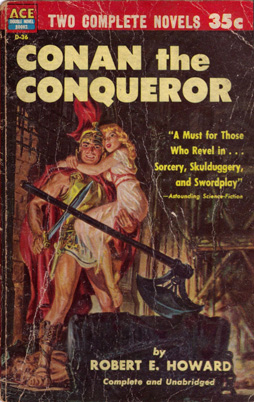 But let’s go back to publication dates. The earliest book on the top 40 of the 2012 list is The Hobbit, from 1937. Titus Groan, in 40th place, is the only other book published before 1950, though three books were published in 1950 (The Lion, The Witch, and the Wardrobe, Gormenghast, and Conan the Barbarian).
But let’s go back to publication dates. The earliest book on the top 40 of the 2012 list is The Hobbit, from 1937. Titus Groan, in 40th place, is the only other book published before 1950, though three books were published in 1950 (The Lion, The Witch, and the Wardrobe, Gormenghast, and Conan the Barbarian).
If we go beyond the top 40, does the situation get better?
Well, the next ten books have two titles from the 1940s (1945’s Animal Farm at 43 and 1943’s The Little Prince at 49) as well as 1936’s At the Mountains of Madness at 45. But after that … Lud-in-the-Mist (1936) is 54, The Worm Ouroboros (1922) is 61, The Wind in the Willows (1908) is 66, A Princess of Mars (1917) is tied for 71, The King of Elfland’s Daughter (1924) is 93, and that’s it for the top 100.
So 10 books before 1950 out of 100, a total of 13 (with the 1950-published books) from the first half of the 20th century. The last 11 years, by contrast, produced 13 of the top 40 books, and 24 of the top hundred (counting The Wheel of Time series, which began in 1990 and ties for 89).
Even given that more fantasy books have been published in recent years than in the first half of the 20th century, that proportion strikes me as strange. At best it suggests an unfamiliarity with the genre. At worst it implies that for some readers, at least, the definition of ‘fantasy’ is narrowing. That classics which do things differently from the modern field are either going unread, or being excluded from contemporary definitions of ‘fantasy.’ So vital writers like Mirrlees, Eddison and Dunsany drop.
One of the things that surprised me looking across the various lists both of books and of authors was how few representatives of the American pulp tradition of fantasy appeared. Robert E. Howard is number 29 in the 1987 ‘favourite novelist’ poll and also in the 1999 ‘favourite author’ poll —where you’d expect someone who wrote primarily short fiction to do well.
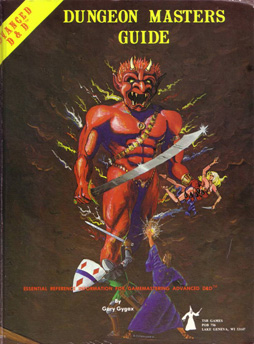 Clark Ashton Smith turns up at only 46 on that list, though Lovecraft reaches number 11. Abraham Merritt’s Ship of Ishtar ties for 110 in 2012, but Merritt doesn’t appear in any of the other polls. Jack Vance does well, primarily with the science-fictional Dying Earth series, and Fritz Leiber is reasonably well-represented, but Leigh Brackett only turns up on the 2012 list in a tie for 257 (with 1953’s The Sword of Rhiannon).
Clark Ashton Smith turns up at only 46 on that list, though Lovecraft reaches number 11. Abraham Merritt’s Ship of Ishtar ties for 110 in 2012, but Merritt doesn’t appear in any of the other polls. Jack Vance does well, primarily with the science-fictional Dying Earth series, and Fritz Leiber is reasonably well-represented, but Leigh Brackett only turns up on the 2012 list in a tie for 257 (with 1953’s The Sword of Rhiannon).
One of the reasons I’m surprised by this is that there’s a relatively well-known reading list of fantasy that features pulp works strongly: Appendix N of the Dungeon Masters Guide. But there doesn’t seem to be any easy link to be made between that list and the Locus results.
Sure, Tolkien and Zelazny do well, but even a writer like Poul Anderson only appears at number 81 in the 2012 list, despite leading off the alphabetical list of writers in Appendix N. John Bellairs’ excellent The Face in the Frost only appears at 296. No book by Lin Carter, August Derleth, Gardner Fox, Manly Wade Wellman, or Margaret St. Clair appears at all in the more-than-600 titles listed in the 2012 poll.
So what does it all mean? Do these polls have any use, or are they too inherently biased to mean anything? More politely, is the Locus audience too idiosyncratic to produce a meaningful result?
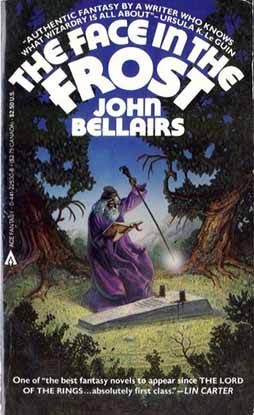 Of course the answers depend on what you’re looking for. Frankly, it’s difficult to tell whether the variation we see across the years reflects a wider fantasy readership, or whether it’s something specific to Locus. The focus on recent texts; the questioning and re-evaluating of 80s fantasy; the continued valuation of writers like John Crowley and Gene Wolfe; the increasing importance of Bulgakov or Ende or Guy Gavriel Kay — maybe it means something, and maybe it doesn’t. Which itself may be the point.
Of course the answers depend on what you’re looking for. Frankly, it’s difficult to tell whether the variation we see across the years reflects a wider fantasy readership, or whether it’s something specific to Locus. The focus on recent texts; the questioning and re-evaluating of 80s fantasy; the continued valuation of writers like John Crowley and Gene Wolfe; the increasing importance of Bulgakov or Ende or Guy Gavriel Kay — maybe it means something, and maybe it doesn’t. Which itself may be the point.
Can we draw any conclusions about what are commonly considered the best fantasy books of the past century or centuries?
Personally, I can’t see it (nor does Locus make any such claim, it has to be said). The lists seem too weighted toward recently-published titles, and effectively exclude both older genre traditions and contemporary non-genre traditions of the fantastic — to say nothing of a bias in favour of white and male writers. I also strongly suspect the lists are shaped by the interests of science-fiction fans rather more than fantasy fans, with science-fictional titles and authors doing disproportionately well.
But then again, you can say that the lists show where issues lie in terms of the awareness of work. That is, an audience that is not wholly uneducated about fantasy seems to be either unaware of or unresponsive to certain areas of the field.
So perhaps for those of us who care about that fiction, about those stories, it’s worth writing and speaking more about those areas in order to increase awareness and appreciation. Any list of best books will be biased. The Locus lists are perhaps most valuable as a heads-up about where the biases are in the speculative fiction readership at large.
Popularity contests at least serve to tell us what is popular. In that if nothing else perhaps they give us some meaningful, though unsurprising, data.
Matthew David Surridge is the author of “The Word of Azrael,” from Black Gate 14. His ongoing web serial is The Fell Gard Codices. You can find him on Facebook, or follow his Twitter account, Fell_Gard.
I read with interest these most recent Locus polls, as I did the NPR poll before it (and participated in them, too). As you point out, we have no firm idea who the participants were or how well-read in the genre they are. Really, I think the poll’s main use is simply to provide unfamilar recent titles to investigate. We would naturally all find things to disagree with in even the “best” poll-generated list, but the relative low placement of many older foundational works and seminal (again older) authors makes me wonder how familiar with the genre and its history most responders really were.
In any case, you dide a hero’s work in so closely examining the results!
[…] Black Gate, Matthew David Surridge examines the Locus readers’ polls from 1987 through 2012 and reaches a few interesting […]
Thanks, Thomas! Glad you liked the post.
The title of your post is aptly named.
In our poll-obssessed culture, statistical findings are rarely enlightening in any clear or obvious way. Much interpretation is needed to make sense of the data.
However, at the end of the day, it seems to me that such data is rarely surprising and so seemingly pointless to a certain degree.
[…] Reading the Entrails […]